

Javelin Photo Sequence
Photo sequence of Steve Backley in 1992 - comments by Max Jones.
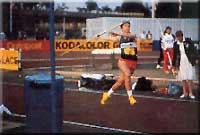 Photo 1 |
Photos 1 & 2: These are taken after the withdrawal of the javelin and have been preceded by a ten-stride approach run Steve uses 5-6 strides between withdrawal and the crossover phase Note the effort to keep tall and the javelin steady and aligned |
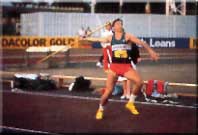 Photo 2 |
|
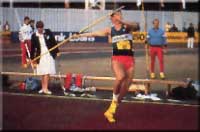 Photo 3 |
Photos 3 & 4 Steve commences the crossover with excellent left leg drive Note the high throwing hand with the hand turned slightly in The left shoulder is high with the left palm turned out, which assists in keeping the left side in the direction of the javelin The eyes focusing on a mid-field point are looking over the left shoulder |
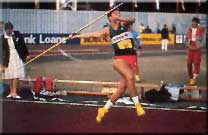 Photo 4 |
|
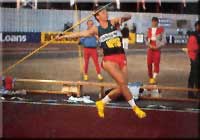 Photo 5 |
Photo 5: Steve maintains his sideways position with the whole of the left side still in the direction of the throw. Hips and chest are kept high, and the head is up and steady |
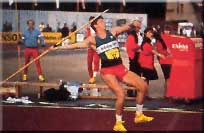 Photo 6 |
Photos 6-9: On the completion of the crossover, it is natural for all throwers to sink to absorb the shock of landing, but Steve fights this tendency, endeavouring to stay tall It is a negative point to sink at the right hip, for it will lose its strike capacity Still sideways, which has produced 'torque', and he has kept the throwing arm relaxed and delayed It is essential to control the point of the javelin at this moment - many throwers drop the throwing hand and subsequently raise the point with disastrous results The hip strike begins as the right foot lands |
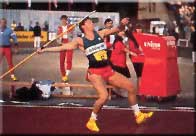 Photo 7 |
|
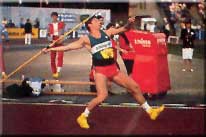 Photo 8 |
|
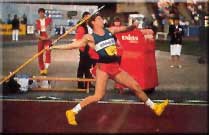 Photo 9 |
|
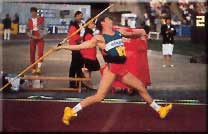 Photo 10 |
Photo 10: Steve benefits from his left side discipline since the premature opening of the left side will mean that the right arm will strike early, e.g. the classical bent arm throwing position. Steve attempts to stay as tall as possible and keep the javelin aligned. Note how the right foot continues to turn and drive the hips forward |
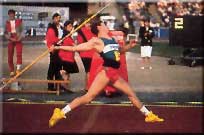 Photo 11 |
Photo 11: Classical Backley - strong hip drive leaving the javelin far back on a high right hand. The left leg is firm, absorbing the power of the right side and acting as a brace |
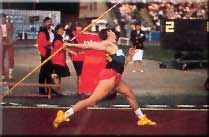 Photo 12 |
Photo 12: The 'bow' that javelin coaches talk about - note how the arm has yet to strike. How many world-class throwers can emulate this position? Note how Steve continues to keep both his head and chin up |
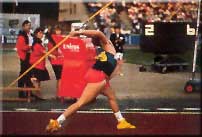 Photo 13 |
Photo 13: Perhaps, in my opinion, the key to Steve's superiority - the drive of the right foot continues even at this point (and beyond) - the rest of the world (mere mortals!) would have ceased driving and left the ground well before. Note the left leg is not collapsing but beginning to strike upwards and forwards to contribute to the throw |
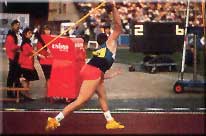 Photo 14 |
Photo 14: The right foot is still down, and therefore the throw is long - loose ground contact, and the throw will be short |
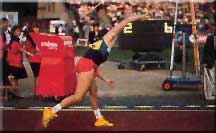 Photo 15 |
Photos 15 & 16: Steve finishes the throw and follows through - throwing through the point of the javelin |
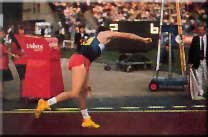 Photo 16 |
Rules of Competition
The competition rules for this event are available from:
Page Reference
If you quote information from this page in your work, then the reference for this page is:
- MACKENZIE, B. (2002) Javelin Photo Sequence [WWW] Available from: https://www.brianmac.co.uk/javelin/photo.htm [Accessed